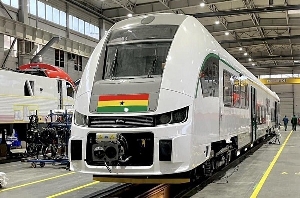General News of Thursday, 30 January 2020
Source: www.ghanaweb.com
Flashback: Government spends ¢210m on drinks
Parliament was thrown in a state of “shock” when the Minister of Education under the Mahama-led government, Alex Tettey-Enyo, announced that the ministry spent a whooping amount of GH¢21,600 on “refreshments” during the various education fora on the duration of years for Senior High School.
Cabinet accepted the proposed reversal to the initial three years which was changed to four years when the opposition party, NPP, were in government.
Addressing the house, Alex Tettey-Enyo, stated that the amount spent on “refreshments” constituted almost fifty percent of the total amount spent on the programme which had over 100,000 participants.
“Madam Speaker, this expenditure was spent on about one thousand participants,” he explained.
The New Patriotic Party who were the minority in parliament at the time questioned the huge sum of money that was spent on drinks.
Read the full story originally published on January 30, 2010, on Ghanaweb
The minority members of parliament were yesterday taken aback when the Minister of Education, Mr. Alex Tettey-Enyo, told the house that as much as GH¢21,600 was spent on refreshments alone during the various educational fora that discussed the duration of the Senior High School programme. The Minister, who appeared before the House to answer questions relating to his ministry, further told the house that the amount represented almost fifty percent of the total amount spent on the programme.
Before the minister could finish his submissions, an unidentified member from the minority side, screamed at the top of his voice “Eei, GH¢21,600 spent on tea alone?”
The minority became jittery about the Minister’s disclosure, and began asking probing questions to know how much was spent on other items. “Madam Speaker, I would like the Minister to give the full details of how much was spent on other items,” asked the Member of Parliament (MP) for Asunafo-North, Robert Sarfo-Mensah. But, Majority Leader Alban Bagbin intervened to give the Minister a lifeline. “Tell them, tell them the number of people who attended the fora,” Bagbin whispered from behind.
With this intervention, Tettey-Enyo told the House, “Madam Speaker, this expenditure was spent on about one thousand participants.” To prevent being heckled by the minority members, who were fired up to ask questions, the Education Minister declined to give further details on the expenditure.
Earlier on, Mr. Tetteh-Enyo told the House that his ministry had communicated the outcome of the fora on the duration of years for Senior High School, in the form of a memorandum to Cabinet for approval.
This, he said, was to enable the government reverse the duration for Senior High School education, from the current four years, to three years. “Cabinet accepted the proposed reversal to three years, and indicated that school enrolment for the three-year program should commence in September 2010,” he told the House.
According to him, Cabinet had also approved the implementation plan for the reversal to three years.
He further told members that the three-year SHS program was still in the preparatory process for its implementation, but gave the assurance that, “the reversal will still take place.”
However, the question of whether or not Parliament would approve the reversal of the four-year duration to three years still remains unknown, since the House appears divided on the issue.
The minority New Patriotic Party (NPP), then in majority, had reversed the duration from three years to four years during their second term in office. Upon assumption of office, the National Democratic Congress (NDC) government decided to change the duration, in fulfillment of its party manifesto and campaign promise.
The NDC criticised the NPP for rushing to make the duration four-years without putting the needed infrastructure, including syllabi and textbooks, in place. However, those in support of the four-year duration argued that increasing the number of the years would help reverse the high number of students who were unable to qualify to the universities and other tertiary institutions, because of inadequate preparation.
The first batch of four-year SHS students, under the reforms introduced by the New Patriotic Party (NPP), is expected to enter the fourth year in the 2010/11 academic year.











